

Angels in Judaism. Crocell. In demonology, Crocell (also called Crokel or Procell) is the 49th spirit of the Goetia, manifesting as an angel with a tendency to speak in dark and mysterious ways.
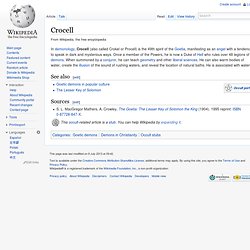
Once a member of the Powers, he is now a Duke of Hell who rules over 48 legions of demons. When summoned by a conjuror, he can teach geometry and other liberal sciences. Dæmon (His Dark Materials) A dæmon /ˈdiːmən/ is a type of fictional being in the Philip Pullman fantasy trilogy His Dark Materials.
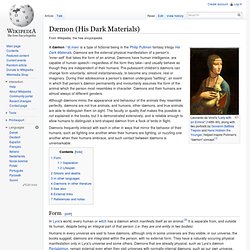
Dæmons are the external physical manifestation of a person's 'inner-self' that takes the form of an animal. Dæmons have human intelligence, are capable of human speech—regardless of the form they take—and usually behave as though they are independent of their humans. Pre-pubescent children's dæmons can change form voluntarily, almost instantaneously, to become any creature, real or imaginary.
During their adolescence a person's dæmon undergoes "settling", an event in which that person's dæmon permanently and involuntarily assumes the form of the animal which the person most resembles in character. Dæmons and their humans are almost always of different genders. Archdemon. In Biblical tradition, an archdemon (also spelled archdaemon) is a spiritual entity, prominent in the infernal hierarchy as a leader of the infernal host.[1] Essentially, the archdemons is the counterpart of the archangels.
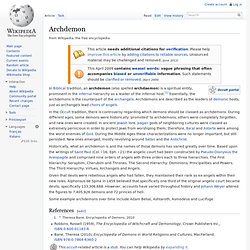
Archdemons are described as the leaders of demonic hosts, just as archangels lead choirs of angels. In the Occult tradition, there is controversy regarding which demons should be classed as archdemons. During different ages, some demons were historically 'promoted' to archdemons, others were completely forgotten, and new ones were created. In ancient Jewish lore, pagan gods of neighboring cultures were classed as extremely pernicious in order to protect Jews from worshiping them; therefore, Ba'al and Astarte were among the worst enemies of God. During the Middle Ages these characterizations were no longer important, but still persisted. Guardian angel. A guardian angel is an angel assigned to protect and guide a particular person or group, kingdom or country.
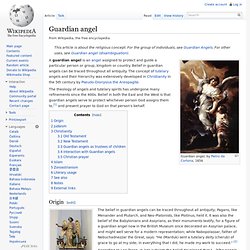
Belief in guardian angels can be traced throughout all antiquity. The concept of tutelary angels and their hierarchy was extensively developed in Christianity in the 5th century by Pseudo-Dionysius the Areopagite. The theology of angels and tutelary spirits has undergone many refinements since the 400s. Belief in both the East and the West is that guardian angels serve to protect whichever person God assigns them to,[1] and present prayer to God on that person's behalf. Origin[edit] Angel. An angel (from the Greek ἄγγελος - ángelos[1]) is a supernatural being or spirit, often depicted in humanoid form with feathered wings on their backs and halos around their heads, found in various religions and mythologies.
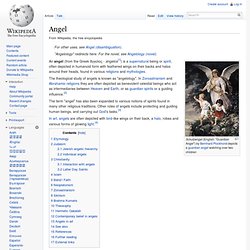
The theological study of angels is known as "angelology". In Zoroastrianism and Abrahamic religions they are often depicted as benevolent celestial beings who act as intermediaries between Heaven and Earth, or as guardian spirits or a guiding influence.[2] The term "angel" has also been expanded to various notions of spirits found in many other religious traditions. Other roles of angels include protecting and guiding human beings, and carrying out God's tasks.[3] Etymology[edit] The word angel in English is a fusion of the Old English/Germanic word engel (with a hard g) and the Old French angele. Judaism[edit] Choronzon. Spelling variations[edit] Choronzon according to Crowley[edit] Otherwise known as the Demon of Dispersion, Choronzon is described by Crowley as a temporary personification of the raving and inconsistent forces that occupy the Abyss.[1][5] In this system, Choronzon is given form in evocation only so it may be mastered.
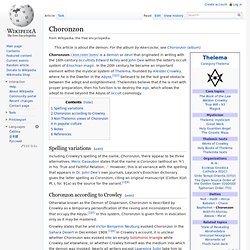
Crowley states that he and Victor Benjamin Neuburg evoked Choronzon in the Sahara Desert in December 1909.[1][6] In Crowley's account, it is unclear whether Choronzon was evoked into an empty Solomonic triangle while Crowley sat elsewhere, or whether Crowley himself was the medium into which the demon was invoked. Nearly all writers except Lawrence Sutin take him to mean the latter. Ananiel. Ananiel, Anânêl (Aramaic: עננאל, Greek: Ανανθνά) was the 14th Watcher of the 20 leaders of the 200 fallen angels that are mentioned in an ancient work called the Book of Enoch.
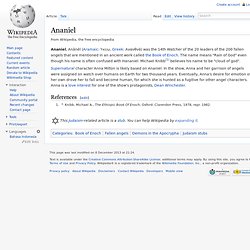
The name means "Rain of God" even though his name is often confused with Hananiel. Michael Knibb[1] believes his name to be "cloud of god". Armaros. Armârôs (Aramaic: תרמני, Greek: Αρεαρώς) was the eleventh on a list of 20 leaders of a group of 200 fallen angels called Grigori or "Watchers.
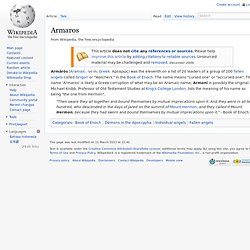
" in the Book of Enoch. The name means "cursed one" or "accursed one". The name 'Armaros' is likely a Greek corruption of what may be an Aramaic name; Armoni is possibly the original. Michael Knibb, Professor of Old Testament Studies at King's College London, lists the meaning of his name as being "the one from Hermon". "Then sware they all together and bound themselves by mutual imprecations upon it. Naberius. The demon Naberius was first mentioned by Johann Wier in 1583.[1] He is supposedly the most valiant Marquis of Hell, and has nineteen legions of demons under his command.
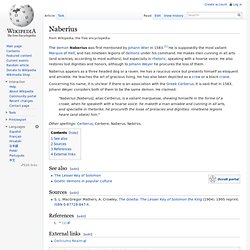
He makes men cunning in all arts (and sciences, according to most authors), but especially in rhetoric, speaking with a hoarse voice. He also restores lost dignities and honors, although to Johann Weyer he procures the loss of them. Concerning his name, it is unclear if there is an association with the Greek Cerberus. It is said that in 1583, Johann Weyer considers both of them to be the same demon.
He claimed: Classification of demons. There have been various demonologies (classifications of demons) in Christian demonology and classical occultism and Renaissance magic.
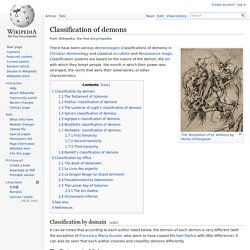
Classification systems are based on the nature of the demon, the sin with which they tempt people, the month in which their power was strongest, the saints that were their adversaries, or other characteristics. Classification by domain[edit] It can be noted that according to each author listed below, the domain of each demon is very different (with the exception of Francesco Maria Guazzo, who seem to have copied Michael Psellus with little difference).
It can also be seen that each author chooses and classifies demons differently. Angels in Judaism. Demon. In Ancient Near Eastern religions as well as in the Abrahamic traditions, including ancient and medieval Christian demonology, a demon is considered an unclean spirit, sometimes a fallen angel, the spirit of a deceased human, or a spirit of unknown type which may cause demonic possession, calling for an exorcism. In Western occultism and Renaissance magic, which grew out of an amalgamation of Greco-Roman magic, Jewish demonology and Christian tradition,[2] a demon is a spiritual entity that may be conjured and controlled. Terminology[edit] The Greek term does not have any connotations of evil or malevolence. In fact, εὐδαιμονία eudaimonia, (literally good-spiritedness) means happiness. The supposed existence of demons remains an important concept in many modern religions and occultist traditions.
Psychological archetype[edit] M. By tradition[edit] Ancient Near East[edit] Amy (demon) Michael (archangel) Michael ("who is like God? ", Hebrew: מִיכָאֵל (pronounced [mixåˈʔel]), Micha'el or Mîkhā'ēl; Greek: Μιχαήλ, Mikhaḗl; Latin: Michael (in the Vulgate Michahel); Arabic: ميخائيل, Mīkhā'īl) is an archangel in Jewish, Christian, and Islamic teachings.
Roman Catholics, the Eastern Orthodox, Anglicans, and Lutherans refer to him as "Saint Michael the Archangel" and also as "Saint Michael". Orthodox Christians refer to him as the "Taxiarch Archangel Michael" or simply "Archangel Michael". Gabriel. In Abrahamic religions, Gabriel (Hebrew: גַּבְרִיאֵל, Modern Gavri'el Tiberian Gaḇrîʼēl, God is my strength; Arabic: جبريل, Jibrīl or جبرائيل Jibrāʾīl) is an angel who typically serves as a messenger sent from God to certain people. Azrael. Abezethibou.